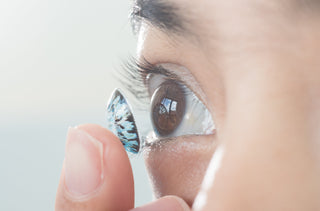Would your child like to wear contact lenses instead of glasses? Do they talk to you about it regularly, and you don't know what to say? At a certain age, children start to care about their appearance. But sometimes, they're still too young to handle the responsibilities of wearing contact lenses. To help you assess your child's readiness, here are 4 telltale signs that your child is ready.
Your child is mature enough to wear contact lenses
There is no ideal age for a child to start wearing contact lenses. It depends on their maturity and ability to put them in and care for them independently. As a parent, you are the most knowledgeable person to make this decision. You know your youngster well—their personality and lifestyle habits.
The key to a successful transition is that the request must come from your child. A child motivated to switch from glasses to contact lenses is much more likely to make the transition successfully.
Your child is responsible
Does your child do household their assigned chores without complaining? Do they clean after their pets regularly? By doing so, your child shows you that they are capable of being independent and responsible. That means they are a good candidate to try contact lenses!
Your child maintains good hygiene
If you notice that your child is becoming more aware of the importance of hygiene, it's a good sign! For example, they will wash their hands without you asking. They may shower regularly on their own and brush their teeth before bed. This shows that they know how to take care of their hygiene. This is a good indication that they are ready to properly care for their contact lenses.
Your child takes care of their glasses
Although they don't find them pleasant to wear, your child understands that glasses are valuable and takes care of them as much as possible. They usually carry their glasses in a case. They avoid leaving their glasses lying around where they could get damaged. If your child cleans their glasses properly, it is safe to assume they'll do the same for contact lenses.
You're better equipped to assess whether your child is ready for contact lenses. Find out the answers to the 2 most frequently asked questions about contact lenses that we have heard from parents.
What are the most commonly recommended contact lenses for children?
Daily disposable contact lenses are generally a good option for children because they are easier to care for. They can be discarded at the end of the day. This reduces the risk of the child developing corneal ulcers and conjunctivitis.
Are there any risks to the eyes of young people who wear contact lenses?
You might think that children are most likely to develop eye diseases from improperly cared for contact lenses, but this is not true. More often than not, adults come into the store with such cases. Why is this? It's probably because children who are allowed to wear contact lenses feel privileged and try to take good care of their precious lenses. After all, it's the only way to avoid glasses!
If you notice that your child is hiding their glasses or not wearing them, it is essential to find a solution quickly since vision is critical to a child's learning. Contact lenses can be an excellent solution for a young one who no longer wants to wear glasses.
Visit your local IRIS store so that an optician can explain to your child how to put the lens in their eyes. Our professionals will also give them the best recommendations for contact lens care. Our team is well-aware of the needs of young children and will be able to help them in this transition!





















































